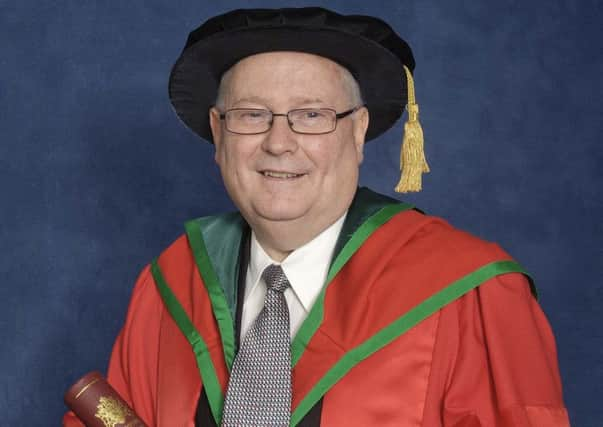Frank Cushnahan tried to get Attorney General to take the media to court


Former banker Frank Cushnahan, who counts among his friends Northern Ireland’s former first Minister Peter Robinson and former Finance Minister Sammy Wilson, tried to get the senior law officer to begin a course of action which could have seen media organisations fined – or journalists being imprisoned.
Mr Cushnahan’s action has only now come to light after the lifting of reporting restrictions around another case which he took after the Attorney General, John Larkin, refused to do as Mr Cushnahan suggested.
Advertisement
Hide AdAdvertisement
Hide AdThe action stemmed from two BBC Spotlight investigative programmes - the first in March 2016 and the second in September 2016 - which made a series of allegations about Mr Cushnahan’s conduct while he was a member of Nama’s Northern Ireland advisory committee.
The first programme broadcast a recording of Mr Cushnahan admitting that he was in line for money in an off shore account as part of the £1.3 billion sale of Nama’s Northern Ireland loans – contrary to what he had previously claimed.
The second programme included a secret recording of Mr Cushnahan accepting a bag of bank notes and then urging the man who gave it to him to lie about the incident to the police.
It has now emerged that Mr Cushnahan – who described himself as “a man of good character, honour and integrity” – took the BBC and Jeremy Adams, editor of the respected Spotlight programme, to the High Court earlier this year seeking an injunction to prevent future Spotlight investigations.
Advertisement
Hide AdAdvertisement
Hide AdThe businessman’s lawyer – the leading libel solicitor Paul Tweed – also claimed that he was protected by anti-harassment legislation, by the Data Protection Act and by the European Convention on Human Rights.
Mr Cushnahan lost the case in March and on Wednesday reporting restrictions were lifted after Mr Cushnahan decided not to appeal, allowing the media to report on what has taken place. It is understood that both sides paid their own costs and Mr Cushnahan has said that he now intends to launch a new case to the European Court of Human Rights.
A written court judgment by Mr Justice Stephens reveals a further significant fact which was not originally brought to the attention of the court – that he had sought and been refused the Attorney General’s consent for the case.
Mr Cushnahan is a suspect in a long-running criminal investigation by the National Crime Agency (NCA), which is investigating the sale of Nama’s Northern Ireland loans. He denies any wrongdoing.
Advertisement
Hide AdAdvertisement
Hide AdHis lawyers argued that the ‘strict liability rule’ for contempt of court meant that it would be unlawful for the BBC to broadcast programmes alleging that he is either suspected of corruption or that he is corrupt.
Essentially, their argument was that he therefore could not get a fair trial if indeed any of the matters ever led to him being charged with an offence.
However, although Mr Cushnahan was interviewed under caution by the NCA and for a period was on police bail, he was not on bail at the time of the programmes, meaning that criminal proceedings were not ‘active’.
The judge said: “In correspondence to the Attorney General it was repeatedly and incorrectly asserted to him on behalf of the plaintiff at a time when criminal proceedings were not active that they were active.
Advertisement
Hide AdAdvertisement
Hide Ad“The consistent response from the Attorney General was that the criminal proceedings were not active within the meaning of the 1981 Act.
“Furthermore in relation to common law contempt of court by letter dated 8 September 2016 Ian Wimpress, solicitor to the Attorney General, stated that ‘you will be aware that it is necessary to demonstrate an intention to interfere with the administration of justice. The Attorney does not consider on the material available to him that it could be plausibly suggested that the BBC has been acting with such an intention.’”
The judge added: “The Attorney General has declined to institute proceedings for contempt of court and has declined to consent to the plaintiff commencing proceedings.”
Elsewhere in his judgment, the judge noted that while Mr Cushnahan claimed that the Spotlight programmes were defamatory of him he had not sued the BBC for defamation.
Advertisement
Hide AdAdvertisement
Hide AdThe BBC argued that Mr Cushnahan was guilty of an abuse of process in that he was seeking protection of his reputation but not using the main law intended to protect his reputation – the Defamation Act.
Mr Cushnahan’s lawyers also initially suggested that the BBC should be compelled to require YouTube to remove the programmes from its website, by taking YouTube to court if necessary, but that demand was then dropped.
The judgment also reveals that the NCA requested that the BBC run its scripts for future Spotlight programmes about Nama past it to minimise the chance of undermining its investigation, but the Corporation declined to do so, arguing that it was vital to refuse the requests in order to maintain editorial control of the programmes.
In the 42-page judgment, Mr Justice Stephens quoted Lord Nicholls’ comments in the seminal Reynolds v Times Newspaper Ltd case in 2001 where he set out what free speech means in practice: “It is through the mass media that most people today obtain their information on political matters.
Advertisement
Hide AdAdvertisement
Hide Ad“Without freedom of expression by the media, freedom of expression would be a hollow concept. The interest of a democratic society in ensuring a free press weighs heavily in the balance in deciding whether any curtailment of this freedom bears a reasonable relationship to the purpose of the curtailment.”